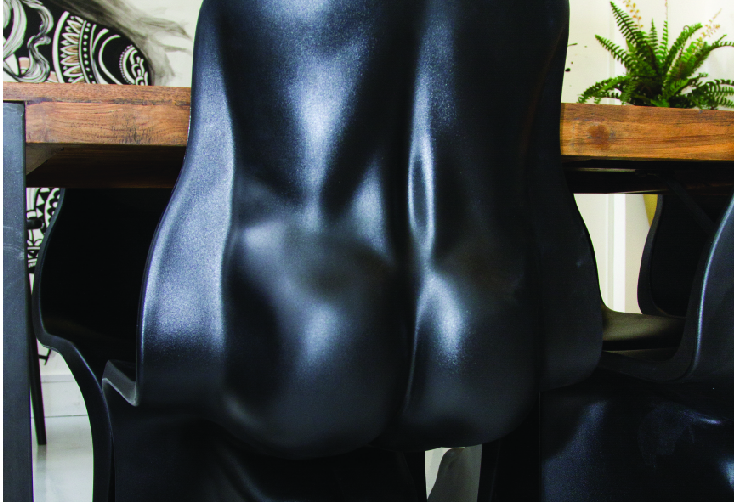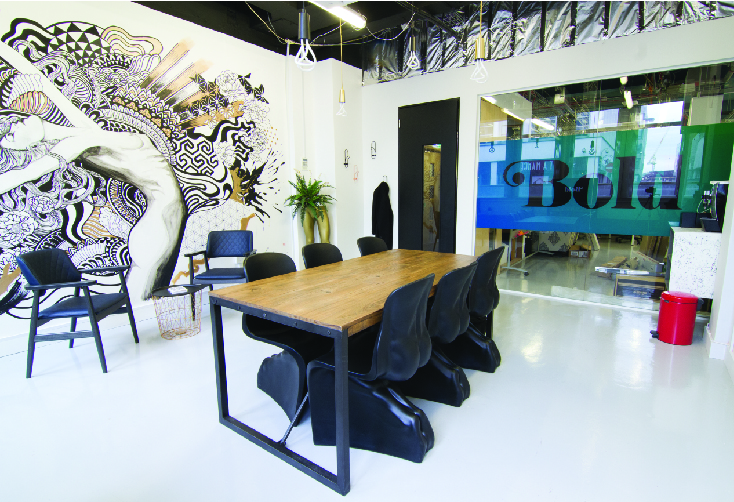The growth of the flexible workspace industry, particularly in London, isn’t just opening new opportunities for serviced office and coworking operators. It’s also paving the way for niche workspace suppliers to identify, and meet, an ever-evolving catalogue of untapped requirements.
One solution that has just hit the scene is Bold, a new brand of meeting spaces in London with a very precise focus.
“Bold is a new brand of small meeting venues, it’s like ‘Zipcar for small meetings’”, explained Caleb Parker, co-founder and CEO of Bold.
Providing a network of design-led spaces specifically for small meetings, Bold aims to capitalise on the growing trend for workspace-on-demand from SMEs and cash-strapped startups. Caleb, the former CEO of MeetingRooms.com, explains that one of the key drivers behind Bold is the growing trend for micro-office consumption; flexible workspace by the month, day, and by the hour.
“The world is moving on, but the commercial real estate sector is still doing business the same way it has for the last century. If we look at companies like Netflix, Spotify, Zipcar, Airbnb, TaskRabbit, and many more, we’re seeing a move from an ownership economy to an access economy.”
Explosive growth in coworking and the prevalence of online meeting room platforms shows that the flexible workspace sector is catching on. However, there is a significant amount of disparity between platforms and inventory, which means supposedly online bookings still require manual intervention.
By contrast, Bold aims to make the process truly digital.
“The Bold platform allows you to tap in and out of Bold spaces for as little as an hour, or up to a full day. It’s all bookable via your mobile, which also acts as the key to unlock the space.”
The ability to book by the hour enables SMEs and cash-strapped startups in London to keep within budget and limit the amount of time and resources they pay for.
Indeed, as one of the world’s most expensive business locations, London is rarely associated with cost efficiency. Even Shoreditch in East London, once the darling of basement-dwelling tech entrepreneurs, has cast off its humble ‘Silicon Roundabout’ persona and rocketed far beyond the realms of pre-funded startups. Knight Frank now claims that Shoreditch, the heart of London’s tech sector, is the most expensive office space of any tech hub in the world.
“It’s no secret that London is expensive, and the SME community needs help,” says Caleb.
In addition to cost-saving, Bold has another secret weapon to help the SME community.
Its meeting rooms aren’t just designed for small meetings. They’re creative, inspiring, design-led spaces that are throwing off the shackles of staid corporate meeting environments. These are quirky, beautiful, curious, brave spaces designed to invigorate the senses and provoke fresh thinking.
After all, no dull conversation could ever take place in one of these chairs:

Caleb reveals that the average business without a base in Central London spends on average £6,000 per year in cafes, while £92million is spent every year in hotels for small meetings under 10 people.
Ryan Simonetti, CEO of Convene and early investor in Bold, believes that there’s a better way to do business. Commenting on his reasons for investing in the new meetings brand, he said:
“We believe that accessing a beautiful space to work or meet shouldn’t require an expensive and risky 5-10 year lease. We see a future not too far off where consuming space to meet and work by the day or even hour will be the norm.”
Caleb added: “Cloud technology has made it so that we no longer need to have an office to be productive at our work.
“We’re targeting both of these markets, creating a brand that’s aesthetically pleasing, hassle free and in touch with SMEs’ desire to remain agile.”
Typically, affordable space in London is associated with shoebox-sized accommodation. However, Bold’s “small” rooms are still relatively spacious; the space is 700 sq ft on average and can accommodate 10 people or less. Every room comes with standard meeting essentials including Wi-Fi, large whiteboards, espresso machine, big screen monitors and plenty of power.
And despite launching only last month, early indications are positive.
“We just launched our first space in Shoreditch [in September], so SMEs can tap in and out of the most expensive tech hub in the world without breaking the bank.

“We will add 100+ more Bold spaces in London over the next 24 months.”
It’s a bold move. Yet the brand has already attracted a range of “prominent” investors from the flexible workspace sector, and has just partnered with CBRE to open more spaces in Central London over the next year.
Caleb describes the partnership with CBRE as “dynamic”, which involves “opening Bold spaces in commercial office buildings and beyond” over the coming months.
“Our platform enables landlords, developers and occupiers to roll out a space-as-a-service amenity within their footprint without starting from scratch. We’ll be opening Bold spaces within CBRE’s footprint as well as within some of their landlord and occupier client spaces.”
This year alone, we’ve already seen a number of traditional real estate firms announce their entry into the flexible space industry. CBRE’s backing represents another significant vote of confidence for the sector, and growing acceptance of the demand for flexible, easy-to-access workspace.
“We no longer want to be locked into long-term commitments or own products outright, we want to access services on-demand. At Bold we believe the same goes for (office) space. We should be able to tap in and out of the space we need as and when we need it.”



 Dr. Gleb Tsipursky – The Office Whisperer
Dr. Gleb Tsipursky – The Office Whisperer Nirit Cohen – WorkFutures
Nirit Cohen – WorkFutures Angela Howard – Culture Expert
Angela Howard – Culture Expert Drew Jones – Design & Innovation
Drew Jones – Design & Innovation Jonathan Price – CRE & Flex Expert
Jonathan Price – CRE & Flex Expert















